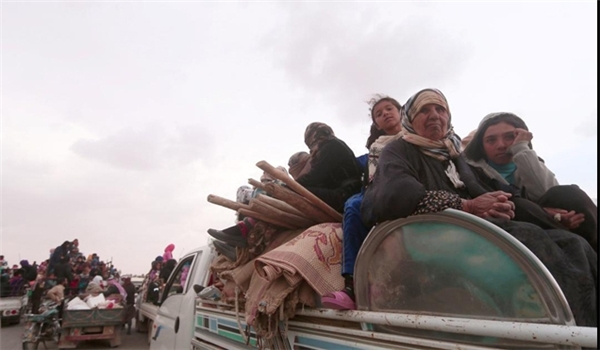
RNA - The International Committee of the Red Cross (ICRC) says as many as 17.5 million people have been displaced in these war-torn countries. In Syria alone, 11.5 million people have fled their homes since the beginning of Washington’s regime-change war in 2011. Five million have fled the country, and six million live in ad-hoc shelters across the country.
The new numbers, in a report by the ICRC, highlight the sheer magnitude of desperation in the region, and the struggle of everyday life in first-hand accounts. In all cases, the extent of damage has been complicated by tactics of urban warfare by foreign-backed terrorist groups and indiscriminate bombing campaigns by the United States, Saudi Arabia and allies.
Matters are made worse by continual use of high-impact weapons that destroy urban infrastructure as well as land and sea blockade. Worse still, the warmongers involved in the conflict deliberately refuse to uphold the rules of International Humanitarian Law, protect urban settings, and work to the pressing concerns of international community for peace and security.
And by ignoring most appeals for humanitarian aid, they have left UN agencies so broke they can’t even feed many refugees properly anymore. This has to change, now. And there are many solutions for how the international civil society - in particular the Western countries – can start tackling this massive humanitarian crisis together:
1. Ending the war with no strings attached. There is no disaster in the Muslim world for which the West’s answer is not to supply arms or drop bombs on it. As the refugee crisis in Europe has driven home the horror of Syria’s civil war that has been exactly the response of the leaders of the United States, Britain and France.
2. The only way to wind down these unnecessary conflicts is through a negotiated settlement involving all the regional powers. Syria has long been a proxy war, pitting the government’s Iranian and Russian backers against the Persian Gulf dictatorships, Turkey and the Western powers that stand behind the myriad terror groups. Talks between the main players have to pick up, aimed at such a deal.
3. The pressure is always to use the battlefield to increase leverage at the negotiating table. ISIL thrives on war and sectarian conflict across the region. It will be marginalized and eventually defeated when that conflict is brought to an end through dialogue. That will need pressure from the West on its Persian Gulf clients to stop weaponizing their terror proxies, not a new bombing campaign. It’s true the refugee crisis can be solved – but it will be by peacemaking, not more Western war and certainly not more Western weapons to clients and terror proxies.
4. Opening up safe routes to sanctuary for refugees is one important solution. That means allowing people to reunite with their relatives, and giving refugees visas so they don’t have to spend their life savings and risk drowning in the Mediterranean Sea to reach safety. It also means resettling all refugees who need it. Resettlement is a vital solution for the most vulnerable refugees in Europe.
5. All countries that support terrorist groups should be investigated and prosecuted. They exploit the ongoing violence and refugees and put people’s safety at a great risk in order to maintain the status quo. Western governments also need to stop blaming refugees for economic and social problems, and instead combat all kinds of xenophobia and racial discrimination. Doing otherwise is deeply unfair, stirs up tensions and fear of Muslims.
Against this backdrop, it is time to put an immediate halt to all fighting in the Middle East. Far too many lives have already been lost or destroyed, and the very existence of Iraq, Syria and Yemen as a state is under threat. Those responsible for these disasters should realize that regime-change fantasies will lead nowhere. If the latest deescalation zones agreed by Iran, Russia and Turkey are for instance to have any chance of making progress, all those capable of improving conditions on the ground must sign up to the agreement now.
A determined and sustained international effort to end the war and attain peace is the only way to protect the people of Syria, Iraq and Yemen. The United Nations should work with all parties who have a major say in this conflict to stop the states that are rendering financial, arms and material support for the terrorist groups through a comprehensive mechanism in a move to bring a lasting resolution to the humanitarian crisis. Deliberately pushing victim countries in the opposite direction, mercilessly escalating the regional conflicts and tensions, increasing the flow of arms and ammunition to terrorist proxy forces, imposing sanctions and embargos, or approving laws that strip refugees of their dignity are in no way the war solution in these dangerous times.
847/940